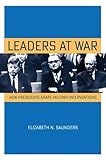Leaders at war : how presidents shape military interventions / Elizabeth N. Saunders.
Material type: TextSeries: Publication details: Ithaca, N.Y. : Cornell University Press, (c)2011.Description: 1 online resource (ix, 302 pages)Content type:
TextSeries: Publication details: Ithaca, N.Y. : Cornell University Press, (c)2011.Description: 1 online resource (ix, 302 pages)Content type: - text
- computer
- online resource
- 9780801460999
- War and emergency powers -- United States -- History -- 20th century
- Politics and war -- United States -- History -- 20th century
- Presidents -- United States -- History -- 20th century
- Political leadership -- United States -- History -- 20th century
- Intervention (International law) -- History -- 20th century
- JK558 .L433 2011
- COPYRIGHT NOT covered - Click this link to request copyright permission: https://lib.ciu.edu/copyright-request-form
| Item type | Current library | Collection | Call number | URL | Status | Date due | Barcode | |
|---|---|---|---|---|---|---|---|---|
 Online Book (LOGIN USING YOUR MY CIU LOGIN AND PASSWORD)
Online Book (LOGIN USING YOUR MY CIU LOGIN AND PASSWORD)
|
G. Allen Fleece Library ONLINE | Non-fiction | JK558 (Browse shelf(Opens below)) | Link to resource | Available | ocn732957073 |
Includes bibliographies and index.
When and how states intervene -- Defining and explaining intervention -- Dwight D. Eisenhower -- John F. Kennedy -- Lyndon B. Johnson -- Before and after the Cold War -- The role of leaders : conclusions and implications.
The use of military force to intervene in the domestic affairs of other states is one of the most contentious issues in contemporary foreign policy. He the author provides a framework for understanding when and why great powers seek to transform foreign institutions and societies through military interventions. She highlights a crucial but often-overlooked factor in international relations: the role of individual leaders. Focusing on the Cold War presidencies of Eisenhower, Kennedy, and Johnson, it is shown that these leaders' threat perceptions influenced both the decision to intervene and the choice of intervention strategy--specifically, whether they believed that threats ultimately originated from the internal characteristics of other states. The author also explores this theory's applicability to other historical and contemporary settings including the post-Cold War period and the war in Iraq.
COPYRIGHT NOT covered - Click this link to request copyright permission:
There are no comments on this title.
